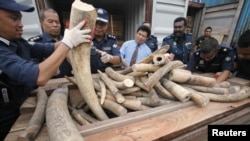BANGKOK —
Malaysian authorities have recovered more than 1,000 elephant tusks in the country’s largest ivory seizure. The seizure comes amid growing reports of the increasing slaughter of African elephants to feed global demand for ivory.
Malaysian customs officials at Port Kelang near Kuala Lumpur uncovered the elephant tusks inside shipping container compartments destined for China, after beginning their journey in the West African port of Togo.
Freeland Foundation Against Wildlife Trafficking Director Steve Galster says the seizure is “extremely significant”, because smugglers look for alternative routes onto the international market, which is largely headed to China.
“The fact that that was seized in Malaysia shows that traffickers are always changing things so they do not get caught. And, it demonstrates that Malaysia is also entering the game of wildlife law enforcement - they are a member of the Association of Southeast [Asian] Wildlife Enforcement [Network]," he said. "They have had some seizures before, so this demonstrates that traffickers are taking a chance about using Malaysia as a transit country too."
The Thai-led ASEAN Wildlife Enforcement Network has seen stepped up policing at ports and air terminals in a bid to curb wildlife trafficking.
Galster says the ivory trade has proceeded under agreements allowing for limited sales of ivory. He says the seizure in Malaysia should be a “wake-up call” that such measures to limit the illegal trade are failing.
“It just shows - I hate to say it - that we need a complete ban again so that law enforcement agencies can catch up with the problem and start putting organized crime gangs behind bars and educating consumers about where ivory is coming from," he said.
The ivory trade has been linked to African armed groups including the Lord’s Resistance Army, al-Shabab and Darfur’s Janjaweed. Rampant poaching has been reported in the Democratic Republic of Congo and Republic of Congo, Cameroon, Kenya, Gabon, Mozambique, Tanzania and Zambia.
Earlier this year in Cameroon, wildlife personnel found 450 slaughtered elephants. In the Democratic Republic of Congo’s Garamba National Park more than 20 elephants were killed apparently by armed groups using military helicopters. The tusks from the kill were said to be worth more than one million dollars.
A program manager with the World Wide Fund for Nature in Thailand, Petchr Manopawitr, says ivory trade is increasing.
“It is alarming that the wildlife smuggler and poacher are increasing ... the number, the real number from Africa for the past two to three years, the amount of elephant poaching is increasing dramatically. The scale of the problem is accelerating," he said.
Chinese authorities have been taking steps to curb the trade in talks with African nations and a media blitz to educate people in China on animal trafficking in general.
In Thailand, laws allow for limited trade in ivory, but policing is difficult and Thailand remains a hub for ivory carving.
International ivory trade is set to feature prominently during the Conference of the Parties to the Convention on International Trade in Endangered Species meeting next March in Thailand.











